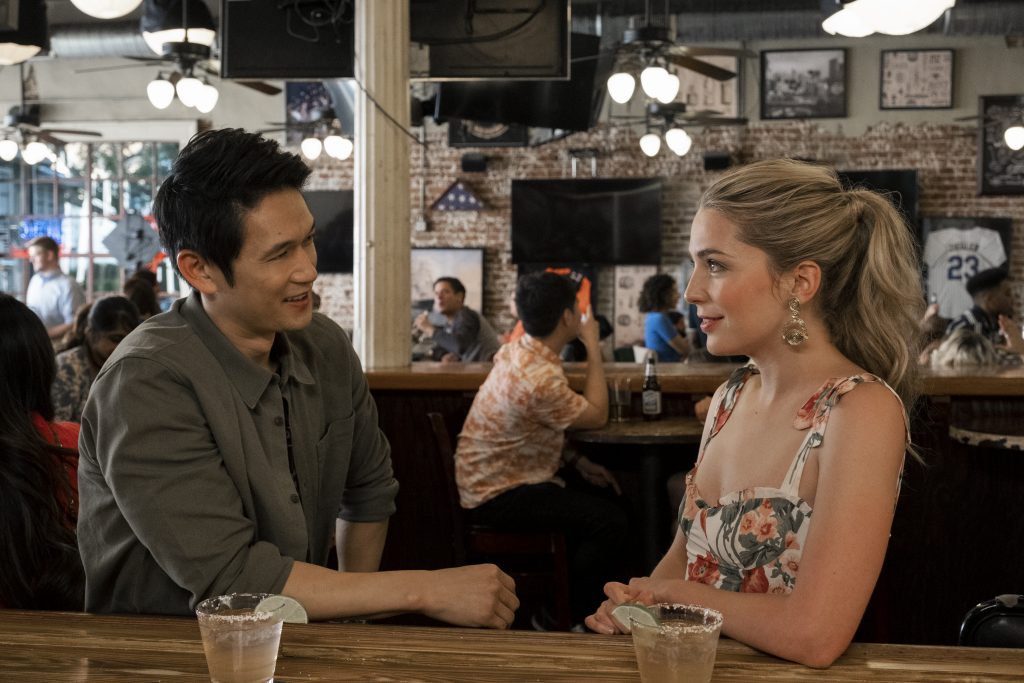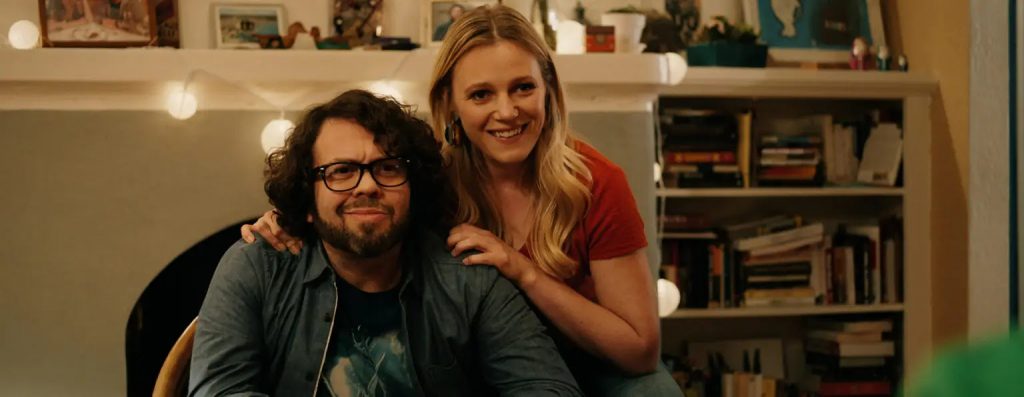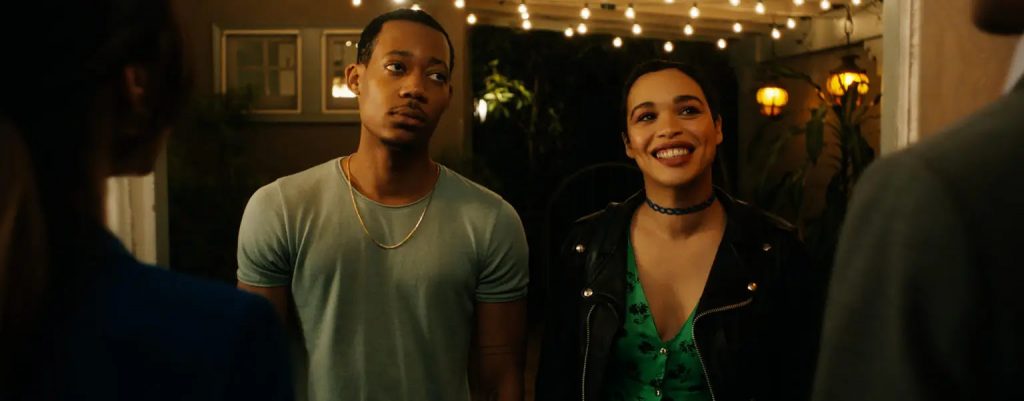January 22, 2021
by Carla Hay
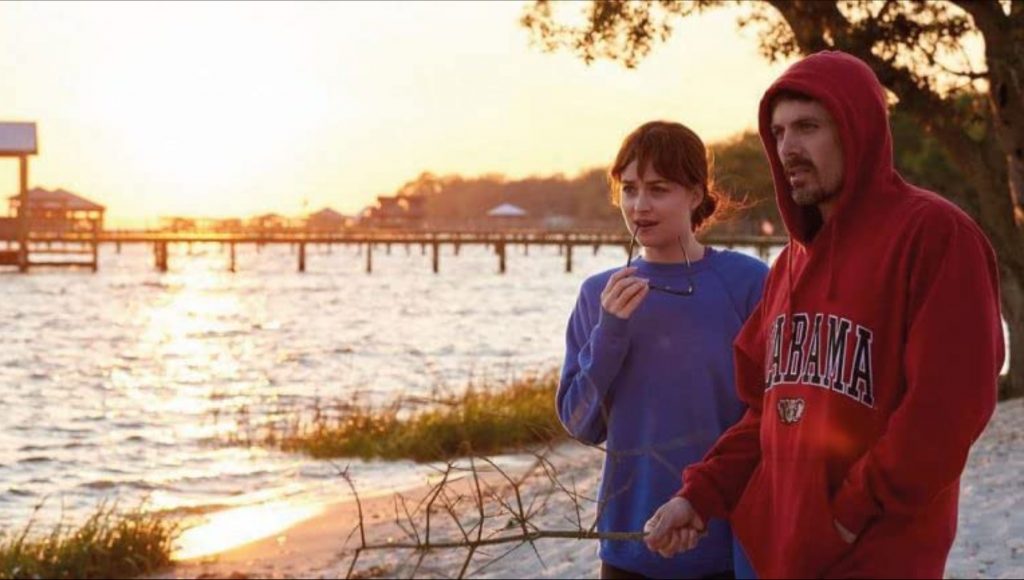
Directed by Gabriela Cowperthwaite
Culture Representation: Taking place from 2000 to 2014 in Fairhope, Alabama; New Orleans; and briefly in Pakistan, the dramatic film “Our Friend” features a predominantly white cast of characters (with a few African Americans) representing the middle-class and working-class.
Culture Clash: A married couple and their male best friend go through ups and downs in their relationship, especially after the wife gets ovarian cancer and the best friend temporarily moves in the family home to help the spouses take care of their two young daughters.
Culture Audience: “Our Friend” will appeal primarily to people interested in emotionally authentic, dramatic movies about loyal friendships and how cancer affects relationships.
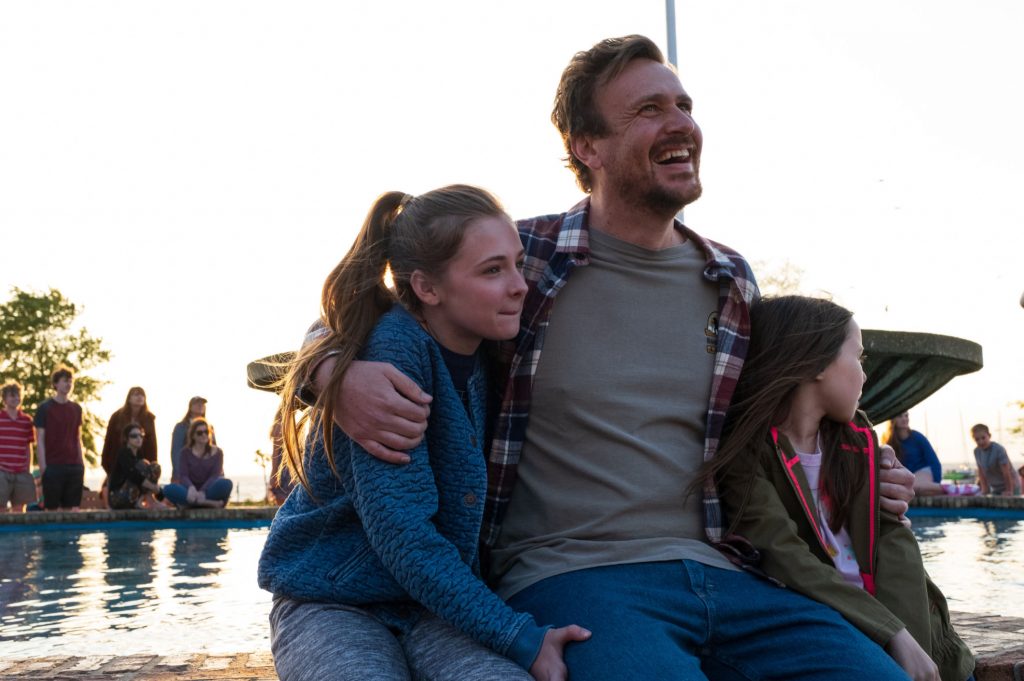
The tearjerker drama “Our Friend,” which is inspired by a true story, departs from the usual formula of a family coping with cancer. When someone in a family has this disease, cancer dramas usually focus on how a spouse, parent or child is dealing with it. Those aspects are definitely in “Our Friend,” but there’s also the unusual component of a male best friend moving into the family household to be a nurturing supporter. Thanks to heartfelt performances from the main cast members, “Our Friend” is a genuine and relatable film, despite being the type of drama where it’s easy to predict exactly how it’s going to end.
Directed by Gabriela Cowperthwaite and written by Brad Ingelsby, “Our Friend” is based on a 2015 Esquire magazine essay titled “The Friend,” written by journalist Matt Teague. (“The Friend” was the original title for this movie.) In this deeply personal article, he described the generosity of Dane Faucheux, the longtime best friend of Matt and his wife Nicole Teague. After Nicole was diagnosed with ovarian cancer, Dane (who was a bachelor at the time) put his life on hold in New Orleans to temporarily move in with the couple in Fairhope, Alabama, to help them take care of their household and the couple’s two young daughters Molly and Evangeline, nicknamed Evie.
The movie “Our Friend” expands on that essay by jumping back and forth in time to show how the friendship between Matt, Nicole and Dane evolved over 14 years, including the highs, lows and everything in between. The movie’s story spans from the year 2000 (when the three of them met) to the year 2014, when Nicole’s cancer was at its worst. The cinematic version of the story avoids a lot of nauseating details that are in the Esquire essay about bodily functions of a cancer patient. Instead, the movie focuses on showing this intense friendship from the individual perspectives of Matt, Nicole and Dane.
Nicole and Dane met each other while living in New Orleans in their early 20s, when she was one of the stars of a local musical theater production and he was a lighting operator in the crew. Nicole is open-hearted, compassionate and the type of person whom a lot of people feel like could be their best friend. Dane is socially awkward and somewhat introverted but an overall good guy who has some immaturity issues.
In the movie, Nicole was already married to Matt when she met Dane, who didn’t know that Nicole was married when he asked Nicole out on a date. Dane’s courtship mistake is never shown in the movie, but it’s mentioned in conversations. Once Nicole told Dane about her marital status, they were able to overcome this minor embarrassment and became good friends. Dane and Nicole are comfortable enough with each other that talk about their love lives with each other.
Dane is thoughtful and generous (he gives homemade mix CDs to Nicole), and he and Nicole love to talk about music, even when they agree to disagree. She thinks Led Zeppelin is “the greatest band ever,” while he doesn’t really care for Led Zeppelin. The Led Zeppelin reference in the movie is significant because two of Led Zeppelin’s original songs—”Ramble On” and “Going to California”—are used in emotional montage scenes in “Our Friend.”
By making Nicole an actress who loves musical theater, “Our Friend” gives Johnson a chance to showcase her singing skills, which are very good but not outstanding. Johnson sings two songs in the movie: “Hands All Hands Around” (from the musical “Quilters”) and a cover version of the Grateful Dead’s “If I Had the World to Give.” Johnson also did some singing in her 2020 movie “The High Note,” so maybe this is her way of demonstrating that she wants to be a professional singer too.
One day, Dane asks for Nicole’s advice about how to approach a theater co-worker named Charlotte (played by Denée Benton) whom he wants to ask out on a date. Unbeknownst to him, Charlotte isn’t attracted to Dane and has already been dating the theater’s stage manager named Aaron (played by Jake Owen). Minutes after Dane confides in Nicole that he’s going to ask Charlotte on a date, Charlotte tells Nicole in a private conversation that she suspects that Dane has a crush on her but Charlotte isn’t interested in dating Dane. It’s one of many examples in the movie that show how Nicole is a trusted confidante to many people in her life and she knows how to make people feel special.
Of course, Dane eventually finds out that Charlotte and Aaron are dating. Dane mopes about it for a little bit when he sees Charlotte and Aaron showing some heavy public displays of affection at a bar on the night that Nicole introduces Matt to Dane. The first time Matt and Dane meet, it’s at this bar, and Dane makes an apology to Matt for asking Nicole out on a date. Matt tells Dane not to worry about it and says that he has no hard feelings.
While Dane watches Charlotte and Aaron from a distance at the bar, Dane seem to takes their coupling way more personally than he should. He grumbles to Nicole and Matt that Charlotte seems to be rubbing her feelings for Aaron in Dane’s face. It’s a sign (one of many) that one of Dane’s flaws is that he can be emotionally insecure and overly needy.
As the movie skips back and forth in time, it’s eventually shown that Charlotte and Aaron have gotten married and have two children together. Charlotte and Nicole remain very close friends, even after Matt and Nicole move to Fairhope. Matt and Nicole relocated to Fairhope so that Nicole could be close to her parents. The parents of Matt and Nicole parents are never seen in the movie. After Nicole finds out that she has cancer in 2012, Matt tells Dane that Nicole has been afraid to tell her parents about the cancer diagnosis.
By the time that Nicole and Matt are living in Fairhope during her cancer ordeal, it’s shown in the movie that their daughter Molly (played by Isabella Kai) is about 11 or 12 years old, while their daughter Evie played by Violet McGraw) is about 5 or 6 years old. Molly is sometimes moody and quick-tempered, while Evie is generally a happy-go-lucky kid. Molly’s personality is more like Matt’s, while Evie is more like Nicole.
Over the years, it’s apparent that Aaron likes to make snide, condescending comments about Dane to other people whenever Dane isn’t around to defend himself. Aaron always makes digs about Dane working in dead-end jobs (such as a sales clerk at an athletic clothing store) and Dane not seeming to have an career goals or any real direction in life. Dane (who has a goofy sense of humor) has tried to be a stand-up comedian, but these dreams never really go anywhere, mainly because he just isn’t that talented. However, when Dane practices his stand-up routine for Nicole, she politely laughs at his corny jokes, and it makes him feel good.
Dave has financial problems, to the point where he’s sometimes temporarily homeless and has to stay at friends’ places or has to move back home with his parents, and he seems unsure of his purpose in life. B y contrast, Matt’s career as a journalist is flourishing. One of Matt’s first jobs was as a reporter at the New Orleans Times-Picayune, where he felt stifled and bored with covering fluffy local news. Matt’s real goal is to be a globetrotting journalist, where he gets to cover what he calls “important” news, such as wars and politics, that can make a big difference in people’s lives.
Matt gets his wish and his career is thriving as a freelancer covering war news for publications such as The New York Times and The Atlantic. But all that traveling has taken a toll on his marriage to Nicole. In 2008, while Matt is on assignment in Pakistan, he and Nicole have an argument on the phone because he took an assignment to go to Libya without discussing it with Nicole first.
Matt doesn’t think that he did anything wrong, because he says that the family needs the money. Nicole, who’s now a homemaker, tells Matt that she feels like she’s a “single parent” and complains to him: “I feel like I married a war correspondent, not a journalist.”
Matt goes home for a few days before he has to go to Libya. And he gets unsolicited advice from Dane to not take the assignment in Libya and stay with the family. This leads to an argument between Matt and Dane where Dane points out Matt’s personality flaws, while Matt insults Dane for having a directionless life with no real career.
Because the movie’s timeline is not in chronological order, viewers have to piece together the ebbs and flows of the friendship between Matt, Nicole and Dane. There are hints that Dane struggles with his mental health, especially in an extended scene taking place in 2010 that shows Dane abruptly packing up and leaving his parents’ house so he can go camping by himself in remote Southwest canyons. Before he leaves, Dane’s older brother Davey (played by Richard Speight Jr.) asks Dane if Dane is having one of his “episodes.”
During this solitary excursion, Dane meets a friendly German camper named Teresa (played by Gwendoline Christie), who’s also traveling by herself. Teresa asks Dane to join her on her hikes. Dane is standoffish at first, but Teresa insists on hanging out with Dane, and he eventually warms up to her a little bit. Teresa senses that Dane is deeply troubled and unhappy with his life, so she shares with him a very personal experience that changes his perspective. It’s one of the better scenes in the movie, proving that not all of the emotional gravitas in “Our Friend” has to do with Nicole’s cancer diagnosis.
However, “Our Friend” is still very much a cancer movie. There’s the heart-wrenching scene showing Matt and Nicole deciding how they are going to break the news to their children that Nicole is going to die from cancer. There’s the predictable scene where Nicole makes a “bucket list” of things she wants to do before she dies, with Matt and Dane frantically trying to make some of the more difficult things on the list (such as being grand marshal of the next Mardi Gras parade) come true for Nicole. And then there are the expected scenes of Nicole having medication-related meltdowns.
The Teague family members also have the misfortune of their beloved pet pug Gracie being diagnosed with cancer around the same time that Nicole gets sick with cancer. While Matt spends time with Nicole in the hospital, Dane has the task of taking Gracie to the veterinarian, who tells Dane that it’s best if the terminally ill dog undergoes euthanasia. Dane, who is not the owner of the dog, is put in the awkward position of having to represent the Teague family when the dog is permanently put to sleep. Dane also has to tell Molly and Evie the bad news about Gracie’s death, because Matt and Nicole are too preoccupied in the hospital.
During all of this cancer drama, Dane gets some pushback and criticism for deciding to move in with Matt and Nicole. At the time of Nicole’s cancer diagnosis, Dane was living in New Orleans and had been dating a baker named Kat (played by Marielle Scott) for about a year. Dane and Kat’s relationship has progressed to the point where Kat has given him spare keys to her home.
At first, Kat was fine with Dane going to visit the Teagues in Fairhope (which is about 160 miles away from New Orleans), as a show of support for the family. But the visits became longer and longer, until Dane eventually moved in with the Teagues. And Kat wasn’t so okay with that decision. Aaron also makes snarky comments to the Teagues’ circle of friends about Dane being a freeloader, until Matt eventually puts Aaron in his place for being such an unrelenting jerk about Dane.
The movie also shows that Matt and Nicole have other challenges in their lives besides her cancer. Before she was diagnosed with cancer, their marriage hit a rough patch due to issues over jealousy and infidelity. And before and during Nicole’s cancer crisis, Molly was feeling resentment toward Matt because of his long absences from home. Molly sometimes lashes out at Matt and makes it clear that she thinks Nicole is a much better parent than Matt is.
The biggest noticeable flaw about “Our Friend” is there seems to be a gender double standard in how the three main characters physically age in the movie. Nicole looks like she’s barely aged throughout the entire movie, even though the story takes place over the course of 14 years. It’s a contrast to how Matt and Dane age over the years, particularly with their hair. In the early years of the friendship, Segel wears a wig to make Dane look younger, while in the later years, he sports his natural receding hairline. Likewise, Affleck’s natural gray hair is seen in the later years of the friendship.
This discrepancy has a lot to do with the fact that in real life, Johnson is 14 years younger than Affleck, and she’s nine years younger than Segel. The real Nicole, Matt and Dane were much closer to each other in age. This movie’s unwillingness to show a woman aging over 14 years and casting a much-younger female co-star as the love interest of the leading male actor are part of bigger age discrimination issues that make it harder for actresses over the age of 35 to be cast as a love interest to someone who’s close to their age.
And when Nicole has cancer, the physical damages from cancer are barely shown. There’s the typical “dark circles under the eyes” look with makeup, as well as mentions of Nicole’s hair falling out because of chemotherapy. (At various times, she wears a headband or a wig.)
But the movie could have used a little more realism in showing the devastating physical toll that cancer can take. More often than not in the cancer scenes, the movie makes Nicole just look like she’s hung over from a wild night of partying, instead of looking like a real cancer patient who’s deep in chemotherapy. It’s not as if Johnson had to lose a scary amount of weight to look like a convincing cancer patient, but more could have been done with makeup and/or visual effects to make it look more realistic that her character was dying of cancer.
However, the filmmakers (including film editor Colin Patton) should get a lot of credit for taking the non-chronological scenes and making everything into a cohesive story that’s easy to understand. “Our Friend” is not the type of movie that can be watched while distracted by something else, because the year that a sequence takes place is shown on the screen to guide viewers. People watching this movie have to pay attention to these milestone year indicators to get the full scope of the story.
“Our Friend” is a well-cast movie where all the actors do convincing portrayals of the emotions expressed in the movie. (Cherry Jones has a small but important role as a hospice nurse named Faith Pruett.) As much as the movie is about Matt and Nicole’s marriage, it’s also very much about the friendship between Matt, Nicole and Dane.
Even though Nicole and Dane were friends before Dane and Matt knew each other, Nicole and Dane’s friendship starts to wane a little bit, the more debilitated with cancer she becomes. There’s a noticeable brotherly bond that develops between Matt and Dane, especially when they have to face the reality of life without Nicole. It doesn’t diminish Nicole’s role in the film, but it realistically shows how relationships can change when people have to prepare for the end of a loved one’s life. “Our Friend” is not an easy film to watch for anyone who hates to think about dying from cancer, but the sadness in the movie is balanced out by the joy of having true love from family and friends.
Roadside Attractions and Gravitas Ventures released “Our Friend” in U.S. cinemas, on January 22, 2021, the same date that Universal Pictures Home Entertainment released the movie on digital and VOD.

